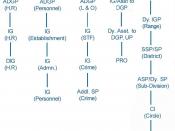Introduction
Management is creative problem solving. This creative problem solving is accomplished through four functions of management: planning, organizing, leading and controlling. Each of these functions involves creative problem solving (Erven, 1999). Creative problem solving is broader than problem finding, choice making or decision making. It extends from analysis of the environment within which the business is functioning to evaluation of the outcomes from the alternative implemented (Erven, 1999). A successful manager possesses several skills. Different levels of management in the organizational structure require different levels of management skills. Managers must possess communication skills, computer skills, time-management skills, human skills, and technical skills.
Planning
Planning involves devising a systematic process for attaining the goals of the organization. Planning prepares the organization for the future (Allen, 1998). Leaders are proactive making change happen instead of reacting to change. The future of any organization requires corporate leadership with the skills to integrate many unexpected and seemingly diverse events into its planning (Allen, 1998).
Every organization must plan for change in order to reach the organization's ultimate goal. Effective planning helps an organization adapt to change by identifying opportunities and avoiding potential problems. In addition, planning lays down the course for the other functions of management and for teamwork.
"Strategic planning produces fundamental decisions and actions that shape and guide what an organization is, what it does, and why it does it" (Allen, 1998). Top level managers are generally involved in the strategic planning process; gathering information, exploring alternatives, and examining future implications of present decisions. The planning process consists of a series of steps:
*Define a mission - the purpose of the organization, why the organization exists.
*Analyze strengths and weaknesses - A SWOT analysis is critical to the creation of any strategic plan.
*Identify opportunities and threats - SWOT is the...


